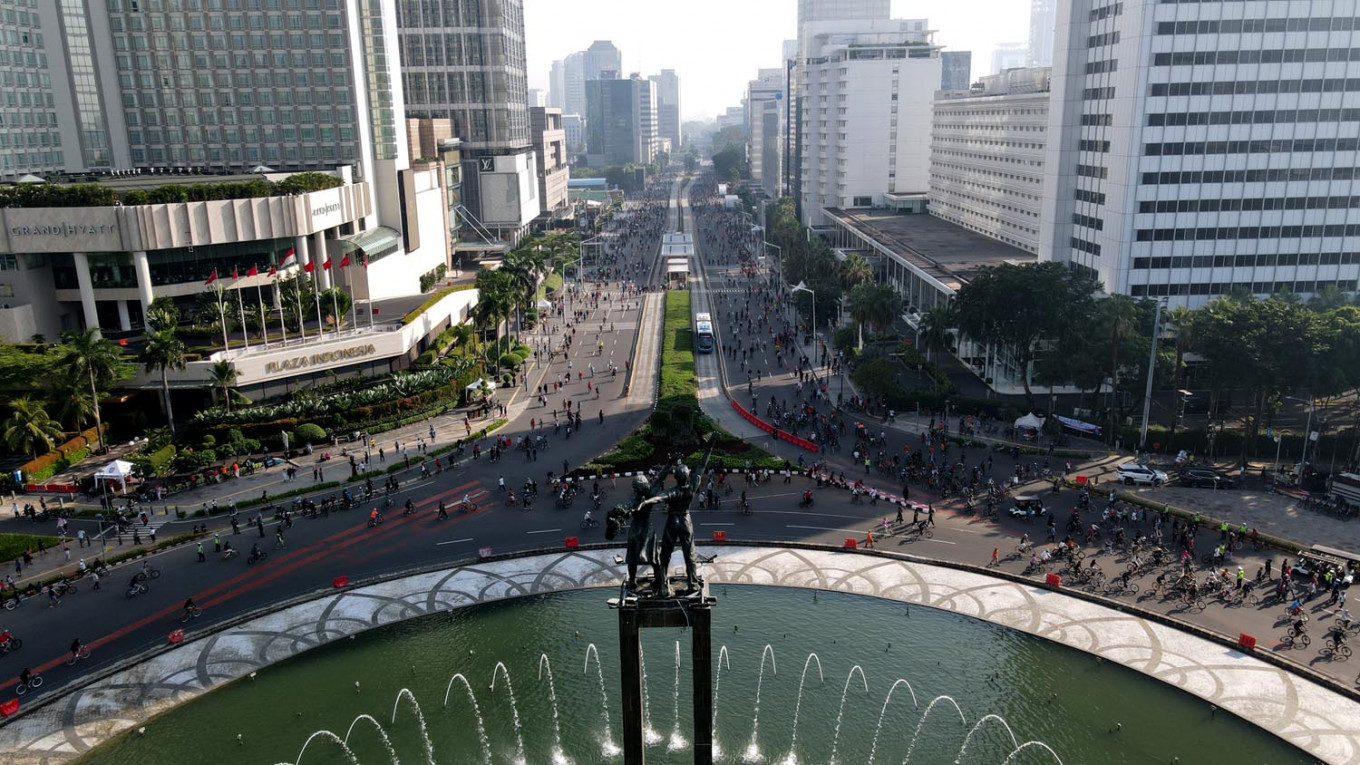Popular Reads
Top Results
Can't find what you're looking for?
View all search resultsPopular Reads
Top Results
Can't find what you're looking for?
View all search resultsCapital or not, Jakarta looks toward urban regeneration
Regardless of whether Jakarta relinquished its capital status, the home to some 10 million people will remain the country’s business and economic center, Jakarta Governor Anies Baswedan said.
Change text size
Gift Premium Articles
to Anyone
 People flock to Bundaran HI traffic circle in Central Jakarta on Sunday, June 21. The Jakarta administration resumed on Sunday the weekly Car Free Day (CFD) on Jl. Sudirman and Jl. MH Thamrin which had been suspended amid the COVID-19 pandemic. Activities have been restricted to bicycle riding and outdoor exercise, with street vendors prohibited from operating.
(JP/Donny Fernando)
People flock to Bundaran HI traffic circle in Central Jakarta on Sunday, June 21. The Jakarta administration resumed on Sunday the weekly Car Free Day (CFD) on Jl. Sudirman and Jl. MH Thamrin which had been suspended amid the COVID-19 pandemic. Activities have been restricted to bicycle riding and outdoor exercise, with street vendors prohibited from operating.
(JP/Donny Fernando)
M
illions have a love-hate relationship with Jakarta, a city that many believe offers a chance at greater fortunes, but that means living with intractable urban issues, from severe traffic congestion to dreadful air pollution and awful flooding.
The central government announced last year that it would relocate the capital to East Kalimantan, easing the pressures on the densely populated Jakarta. But then the COVID-19 pandemic hit, with its impacts on the economy threatening to derail the relocation plan as the government struggles to secure financing. Much of the preparatory work has been delayed as the government shifts its focus to tackling the pandemic.
While President Joko “Jokowi” Widodo has yet to make a public statement on the project’s continuation, he will announce a decision “at the appropriate time”, said National Planning Agency’s (Bappenas) regional development deputy head Rudy Soeprihadi Prawiradinata, who is part of the team in charge of the project.
Regardless of whether Jakarta relinquished its capital status, the home to some 10 million people will remain the country’s business and economic center, Jakarta Governor Anies Baswedan said.
Jakarta contributed 17.34 percent to Indonesia's gross domestic product (GDP) in 2018, the greatest contribution of all provinces, which highlights its significance to the country’s economy.
“Jakarta will continue to serve as the center of business and the economy. We arrived at this role from a very long process. So, I think that role will continue. It will not change,” Anies told The Jakarta Post on Saturday.
In addition, Jakarta was determined to become a resilient city, he said.
“The pandemic has opened up our eyes about the direction a resilient city needs to head in. […] The good provision of basic services is not enough. What is needed in the future are resilient urban services,” Anies said, adding that Jakarta must transform itself into a “digital-oriented city”.
Anies said he believed Jakartans would see their long struggle against the COVID-19 outbreak as an opportunity to advance the city’s development.
“I believe when we come out of this crisis, the public sector, as well as the private sector will be able to utilize opportunities in this city in a better way,” he said.
Before the pandemic hit the city, a series of development projects had been planned to make the city more livable, including a Rp 571 trillion (US$40.5 billion) "urban regeneration" project. The 10-year plan will focus on infrastructure development, including the creation of a better integrated public transit system and the improvement of the city’s clean water and wastewater systems, housing and flood control system.
The city has sought to pursue the project through private-public partnerships.
With the pandemic forcing many countries and businesses into austerity mode, Anies said the city administration would need to seek creative funding options.
“The agenda [still] stands, but given the fact we are experiencing a significant [economic] contraction, those projects will need alternative financing,” he said.
Rudy from Bappenas said the capital relocation plan would leave Jakarta unchanged aside from its status as the capital.
It will retain its provincial special autonomy status so that the city administration may effectively manage the 661 square kilometer region and its urban regeneration project will continue, Rudy said.
Unlike other provinces, regional elections are only held in Jakarta to elect the governor. While in most other provinces, regional elections are held to elect mayors and regents, the Jakarta governor has the sole authority to appoint the city’s civil servants as mayors and regents of the city’s six administrative areas.
“We have invested so much in Jakarta, so we want it to return to being a livable city [by addressing] its existing problems such as traffic congestion, land subsidence and sea-level rise. We also want to restore its role as the center of the economy,” Rudy said.
"Do not let Jakarta, a place where we have invested so much, stop developing."
During the first quarter of this year, Jakarta recorded its lowest economic growth rate in a decade of 5.06 percent, according to the Jakarta chapter of Statistics Indonesia (BPS Jakarta).
The yearly city budget was also cut in half, leaving many urban development projects in limbo.
Regional Autonomy Watch (KPPOD) executive director Robert Endi Jaweng said Jakarta, which relies heavily on the trade and service sectors, would face an arduous journey to regain its economic capacity. He said Jakarta’s recovery should be a collective effort involving the city administration, central government and private sector.
Yet, he said bringing the COVID-19 outbreak under control should be Jakarta’s utmost priority.
“Public health is not merely about protecting human rights. It is also the main factor that will determine whether the economy will make it through the pandemic or not,” he said. “The economy cannot cope under a lengthy period of uncertainty [created by the pandemic].”









